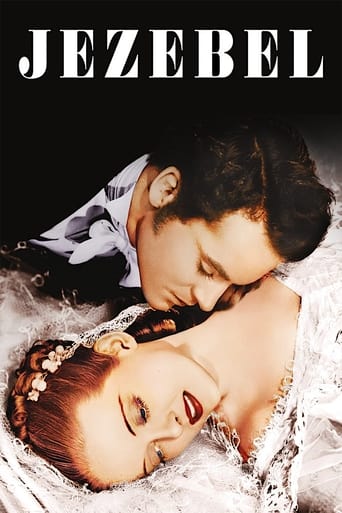mattfloyd-41009
Jezebel depicts how the South's idea of conservatism was going to crash and burn on its head even before the Civil War was to be waged due to the immature/petty environment not considering what the consequences were coming as a result of their stubborn lack of actions- indeed the South's tragedy is that it relied too much upon outdated conventions whilst ignoring the human/environmental costs being allowed to happen all around their lack of moral judgment. New Orleans is punished for its willing failure to uphold their spiritual obedience to God's benevolent commands, such as lovingly respecting their fellow human being's sense of personal liberties, preserving the natural landscape, investing in creatively advanced techniques in a sufficient manner to further help their city out of harm's way and protecting the community's legal/moral civil rights, with a fatal plague, almost as if the plague was an allegory for all of the death and destruction that all of humanity will endure if they continue to permit selfishness to rule their lives.Both Julie Marsden (Bette Davis) and her lover, Preston Dillard (Henry Fonda) make costly mistakes when they act out of pure jealous pettiness when they don't get their ways as per se demanded- hers is to rebel not out of earnest pleas for social justice but out of an inhuman spite; his is to conform with disciplinarian social dictations instead with his own compassionate conscience. These mistakes ruin their lives as neither one wants to apologize for their soul-deadening decisions- however only Julie spiritually redeems herself when she realizes that life-altering consequences do happen as a result of her carelessly thought out decisions and metaphorically baptizes herself as she saves her former finance's new wife from innocently suffering under a swift punishment. Thus, she regains her dignity as she and Preston join countless other souls upon the danse macabre.The slaves' depiction is what keeps Jezebel from reaching a true masterpiece status as they're unwisely portrayed as "a happy-go-lucky, singing lot" (again). However, to be fair to the movie, they're at least given an attempted aurora of genuine personality and their singing scene marks Julie's genuine rebirth as she subconsciously realizes her mistakes and gains a desire to become a better human being, signaled by her joining into their custom dance. Yet, this scene of spiritual resurrection is reserved only for Bette Davis' character, not for her fellow black dancers- even then, these gospel-filled instruments aren't allowed to blossom as fellow characters due to both their race (black) and their inhumane/unwanted captivity (their illegal enslavement and treatment in an already hypocritical society).
bombersflyup
Jezebel is a reasonable romance flick, that is engaging and well acted.There is no great story and it is rather unendearing and cold. However, I watched on with interest. Of course she is angry, why would he bring another woman to the house of the girl he left at the doorstep. There isn't a lot of depth in the characters as there is too much blather, so I don't know what I'm suppose to get out of this.
jackcade1450
One of the most boring movies I've seen with Bette Davis. Complete lack of characterization. Don't fall for the William Wyler hype machine, this one's a dud.
zardoz-13
Bette Davis gives a memorable performance as the eponymous character in director William Wyler's "Jezebel," a tragic tale of rivalry and romance in antebellum Louisiana about a treacherous dame who defies society and flaunts custom to get what she wants. Miss Julie wants handsome banker Preston Dillard. Temperamental, vain, and sagacious, Julie lives to please only herself and to the devil with anybody else. Basically, this is a classic treatment of girl wants guy, girl loses guy, and girl wins guy back of the most unorthodox kind. ScenaristS Clements Ripley, Abem Finkel, and John Huston based their sensational screenplay on Pulitzer Prize winning playwright Owen Davis' drama and there isn't a moment that isn't gripping. Mind you, "Jezebel" is not only set in the pre-Civil War South, but it was produced in Hollywood during the Jim Crow era. The protagonist makes a disparaging remark about sullen African-Americans and Wyler presents the slaves as obsequious and ignorant in their happiness. However, though this casts a pall over the narrative, it doesn't detract from his evocative portrait of a woman who refuses to stop loving her man even when he has taken a marriage vow to another woman. Incredibly enough, "Jezebel" gives a fairly accurate depiction of the troubles that plagued the South in those days before the Civil War. Nobody gives a bad performance and George Brent is particularly good as Buck Cantrell, an arrogant, pretentious blow-hard who receives his comeuppance. Oscar-winning "Gone with the Wind" lenser Ernest Haller makes everything look appropriately cinematic and you can tell who occupies the moral high ground. Wyler stages the duel between Buck Cantrell and Ted Dillard in such a way as to generate undeniable suspense. "Jezebel" is simply brilliant.





